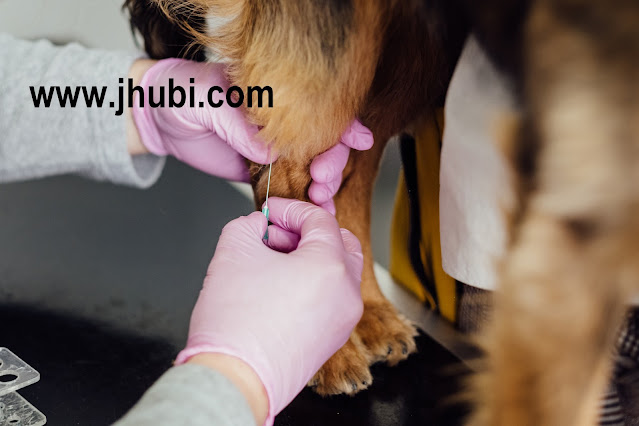A dog can experience various functions of the liver when afflicted with liver disease. The liver plays a crucial role in digestion and aids in metabolizing fats, proteins, carbohydrates, vitamins, and minerals for the dog's well-being. Additionally, the liver filters toxins and waste products from food and medications. Liver disease, also known as hepatic disease, can lead to severe illness in pets. However, some liver issues can be less critical, and the liver possesses a remarkable ability to repair itself during the early stages of the disease. Recognizing liver problems beforehand can help prevent further damage and assist in nursing a sick dog back to health.
Understanding Liver Disease:
Liver disease refers to any abnormality that disrupts the liver's normal functioning. Various types of liver diseases exist, including bile duct obstruction, portosystemic shunts, autoimmune diseases causing liver scarring, and liver tumors, which are more common in older dogs and can be either cancerous or benign, impacting the surrounding liver or nearby organs.
Bile Acid Test:
Veterinarians utilize a bile acid test to assess the liver's proper functioning in animals. This test aids in diagnosing several health issues, including liver disease, by evaluating the blood supply to the liver, the presence of healthy liver cells, and the free movement of bile through the liver.
Symptoms of Liver Disease in Dogs:
Liver problems in dogs can manifest in various symptoms, but often there are no noticeable signs until the disease has advanced. Regular examinations and blood tests, especially for older dogs, are essential.
Some common symptoms of liver disease include:
1. Jaundice (yellowing of the eyes, tongue, skin, or mucous membranes)
2. Lethargy
3. Vomiting, loss of appetite, or diarrhea
4. Distended abdomen
5. Unsteady gait
6. Fever
7. Seizures
It is crucial to have a veterinarian evaluate any severe gastrointestinal disturbances or neurological issues like loss of balance or seizures to determine the cause and provide appropriate treatment.
Causes of Liver Disease:
Liver disease can have various causes depending on the specific type of liver disease:
1. Acute liver disease can result from exposure to toxins, excessive heat, or secondary liver damage due to toxins affecting other organs.
2. Biliary obstruction may arise from inflammation, infections, tumors, gallstones, or mucocele formation.
3. Portosystemic shunts can be present at birth or develop due to other liver problems.
4. Chronic hepatitis can result from an overactive immune system, infections, toxins, or damage from which the liver couldn't fully recover.
5. Viral, bacterial, fungal, or parasitic infections can also lead to chronic liver problems.
Diagnosing Liver Disease in Dogs:
If liver disease is suspected, a veterinarian will conduct lab tests to assess organ function. Elevated liver enzymes, such as ALT, AST, and ALP, along with bilirubin and albumin levels in the blood, provide vital information about the liver's health. A complete blood count can indicate the presence of infections or inflammation. Abdominal imaging, such as X-rays or ultrasound, can reveal scar tissue or tumors, and a liver biopsy may be necessary to get a definitive diagnosis of the cause.
Treatment for Liver Disease:
The treatment approach depends on the type and severity of liver disease:
1. Acute liver disease may be treated with fluids, electrolytes, and restricted activity, along with medications and liver supplements.
2. Biliary obstruction can be managed with medications like ursodiol or may require surgery in severe cases.
3. Portosystemic shunts often require surgery to correct the abnormal vascular connection.
4. Chronic hepatitis is managed with medications, a restricted diet, and supportive therapy.
5. Liver tumors or cancer may necessitate surgery, chemotherapy, and medications based on test results.
Prognosis for Dogs with Liver Disease:
The prognosis for dogs with liver disease varies depending on the type and severity of the disease. Dogs with congenital defects or benign tumors can often be cured with surgery. Chronic inflammatory liver disease is typically incurable, but dogs can live comfortably with medication and dietary management for extended periods. Liver cancer has a poor prognosis, and management involves surgery, chemotherapy, drugs, and diet to improve the quality of life for a limited time.
Preventing Liver Disease:
To maintain a healthy liver in your dog, regular check-ups are essential, and certain measures can be taken:
1. Avoid feeding fatty foods that may lead to pancreatitis and subsequent liver issues.
2. Ensure your pet is fully vaccinated to prevent infectious liver diseases like leptospirosis.
3. Keep toxins out of your dog's reach.
4. Provide regular exercise to prevent liver disease resulting from a sedentary lifestyle and overeating.
Types of Liver Disease in Dogs:
1. Obstruction of the bile ducts can be caused by inflammation, parasites, fibrosis, benign tumors, or cancer. Treatment involves addressing the underlying cause and may require surgery in some cases.
2. Portosystemic shunts are abnormal vascular connections between the liver and other organs. Surgery is often necessary to correct the shunt.
3. Chronic hepatitis is inflammation and cell damage in the liver, which can be managed with dietary changes, medications, and supportive therapy.
4. Liver tumors can be benign or malignant, and treatment may involve surgery and chemotherapy based on the disease's stage.
Remember, if you suspect your pet is unwell, promptly contact your veterinarian. Always seek advice from your veterinarian for health-related questions, as they have the necessary expertise in diagnosing and treating your pet's specific health conditions. The information provided by Point Pet is backed by high-quality sources, such as peer-reviewed studies, to ensure accuracy, reliability, and credibility in our articles. For more details on our editorial process, please refer to our guidelines.
Pet Hospitals in America
| Hospital Name | Website |
|---|---|
| American Pet Hospital | https://www.americanpethospital.com/ |
| Banfield Pet Hospital | https://www.banfield.com/en |
| American Veterinary Hospital | https://americanvethospital.com/ |
| Northridge Pet Hospital | https://www.northridgepethospital.net/ |
Pet Hospitals in Canada
| Hospital Name | Website |
|---|---|
| VCA Canada | https://vcacanada.com/ |
| Animal Health Partners | https://animalhealthpartners.com/ |
| Southpointe Pet Hospital | https://www.southpointepethospital.ca/ |
| Vancouver Animal Emergency and Referral Centre (VAERC) | https://www.animalemerg.com/ |
Frequently Asked Questions (FAQs) about Liver Disease in Dogs:
1. What is liver disease in dogs, and what functions does the liver perform?
Liver disease in dogs refers to any abnormality that affects the liver's normal functioning. The liver plays a crucial role in digestion and helps metabolize fats, proteins, carbohydrates, vitamins, and minerals necessary for the dog's well-being. Additionally, it filters toxins and waste products from food and edications.
2. How critical is liver disease in dogs, and can it be reversed?
Liver disease, also known as hepatic disease, can lead to severe illness in pets. However, the liver has the remarkable ability to repair itself during the early stages of the disease. Recognizing liver problems beforehand can help prevent further damage and improve the chances of nursing a sick dog back to health.
3. What are the common symptoms of liver disease in dogs?
Liver problems in dogs can manifest in various symptoms, but often there are no noticeable signs until the disease has advanced. Some common symptoms include jaundice (yellowing of the eyes, tongue, skin, or mucous membranes), lethargy, vomiting, loss of appetite, diarrhea, distended abdomen, unsteady gait, fever, and seizures.
4. How can I identify if my dog is suffering from liver disease?
Regular examinations and blood tests, especially for older dogs, are essential for identifying liver disease. It is crucial to have a veterinarian evaluate any severe gastrointestinal disturbances or neurological issues like loss of balance or seizures to determine the cause and provide appropriate treatment.
5. What are the different causes of liver disease in dogs?
Liver disease can have various causes depending on the specific type of liver disease. Causes include acute liver disease from exposure to toxins or excessive heat, biliary obstruction from inflammation, infections, tumors, or gallstones, portosystemic shunts, chronic hepatitis from an overactive immune system or infections, and viral, bacterial, fungal, or parasitic infections.
6. How is liver disease diagnosed in dogs?
Veterinarians conduct lab tests to assess organ function if liver disease is suspected. Elevated liver enzymes, bilirubin, and albumin levels in the blood, along with a complete blood count, can provide vital information about the liver's health. Abdominal imaging, such as X-rays or ultrasound, and liver biopsy may also be necessary to get a definitive diagnosis.
7. What are the treatment options for liver disease in dogs?
The treatment approach depends on the type and severity of liver disease. Acute liver disease may be treated with fluids, electrolytes, medications, and liver supplements. Biliary obstruction can be managed with medications or surgery in severe cases. Portosystemic shunts often require surgery to correct the abnormal vascular connection. Chronic hepatitis is managed with medications, a restricted diet, and supportive therapy. Liver tumors or cancer may necessitate surgery, chemotherapy, and medications.
8. What is the prognosis for dogs with liver disease?
Dogs with congenital defects or benign tumors can often be cured with surgery. Chronic inflammatory liver disease is typically incurable but can be managed for extended periods with medication and dietary management. Liver cancer has a poor prognosis, and management involves improving the quality of life with surgery, chemotherapy, drugs, and diet.
9. How can I prevent liver disease in my dog?
To maintain a healthy liver in your dog, routine check-ups are essential, along with certain preventive measures. Avoid feeding fatty foods, ensure your pet is fully vaccinated to prevent infectious liver diseases, keep toxins out of your dog's reach, and provide regular exercise to prevent liver disease resulting from a sedentary lifestyle and overeating.
Maybe some peoples are searching about:-
1. A Guide to Liver Disease in Dogs
2. Signs and Symptoms of Liver Disease in Dogs
3. Taking Care of Your Dog's Liver Health
4. Common Symptoms of Liver Problems in Dogs
5. Diagnosis and Treatment of Liver Disease in Dogs
6. Preventing Liver Disease in Your Dog
7. Understanding Jaundice in Dogs
8. Abnormal Vascular Connections: Portosystemic Shunts in Dogs
9. Managing Chronic Hepatitis in Dogs
10. Identifying and Treating Liver Tumors in Dogs





0 Comments